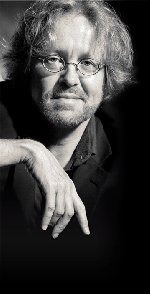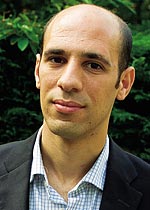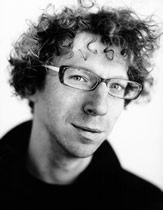WIR
The Writer-in-Residence Program at our department was initiated by the Foundation for the Production and Translation of Dutch Literature in Amsterdam, 2004. In the frame of this program a Dutch author comes each year for six weeks to Budapest in order to give lectures on his or her own works for students of Dutch. Condition is that the author is already translated into Hungarian.
 (April - May)
(April - May)
Thomas Rosenboom (1954) visits the Dutch Department at the Eötvös University as writer-in-residence. He is one of the most prominent prose writers of the Netherlands. In 2007 there was a translation workshop organized by the Dutch and Hungarian Translators' Houses around a short story of his 'De jongen met de viool.'
During his stay in Budapest in 2009 he is going to give a series of lectures on his historical novel 'Publieke Werken' (1999). This novel will be published in Hungarian translation (Judit Gera and Zsófia Tálasi) by Gondolat Publishing House for the International Budapest Book Fair 2009.
The visit of this outstanding Dutch author is subsidized by the Dutch Literary and Translation Foundation.
More about Thomas Rosenboom: here
 (February – March)
(February – March)
Jaap Scholten (1963) gave six lectures at the Dutch Department of Eötvös University on contemporary Dutch literature and his own work.
1.The Netherlands and Hungary. Dutch writers on Hungary and Central Europe. Ter Borgh’s Turkenoorlog, Den Doolard, Tommy Wieringa, Jan Cremers De Hunnen, Jaap Scholten. The childrens' trains. The historical contacts between the two countries.
2.Myths and stories. The richness of stories in Central Europe against the flat landscape of the Low Countries. Erzsébet Báthory versus Hansje Brinker. Travel stories & Pilgrimages of Jaap Scholten.
3.Town en countryside. The difference between the literature of the big city and that of the countryside. (W.F. Hermans: `All great literature is provincial literature’). The role of the town and that of the countryside in Dutch literature. Tachtig, Nescio, Hermans.
4.The solid basis of Dutch welfare: the VOC, the forefathers of industry and the commercial spirit. Heren van de thee by Hella Haase, Tachtig by Jaap Scholten, Aartsvaders by Wim Wennekes, Lijmen by Elsschot.
5.Coffee shops en the multicultural society. The Dutch tolerance policy and the problems of the multicultural society. How does Western Europe try to stimulate a multicultural society in Eastern Europe where Western Europe does not believe in anymore? Theo van Gogh. Etc.
6.The hidden class society. Tachtig, Morgenster; the dialect of the nobility of Agnies Pauw van Wieldrecht. Thomas Rap and Van Lennep. The ruthless social structure of the Netherlands. The use of language in order to define the social group. The influence of this in literature.
Jaap Scholten's published work: Bavianehaar & Chipolatapudding (short stories 1990), Tachtig (novel 1995), Morgenster (novel 2000), Reisverhalen & Bedevaartstochten (travel stories 2002). Filmscripts (Beauville, Wodan!, Mercedes), stories and articles in different journals and columnist in NRC Handelsblad since three years. Sweetheart (roman 2007).
More about Jaap Scholten: here
 (September - October)
(September - October)
His novel Bruiloft aan zee (Amsterdam: Vassallucci, 1996) has been translated into Hungarian by Miklós Fenyves (also ex-student of the Center) as Menyegző a tengernél (Budapest: Gondolat, 2005).
Abdelkader Benali's lectures
(summaries by Lisa Lehner)
More about Abdelkader Benali: here
 (September - October)
(September - October)
Two of his novels Blauwe Maandagen (Amsterdam: Nijgh & Van Ditmar, 1994) (Uborkaszezon Budapest: József Attila Kör, 2000) and Fantoompijn (Amsterdam: Nijgh & Van Ditmar, 2000) (Fantomfájdalom, Budapest: Gondolat, 2002) has already been published in Hungarian. At the time of his arrival his volume of short stories Amuse-Gueule (Ínyencek, Budapest: Gondolat, 2004) came out. His translator is Szabolcs Wekerle, an ex-student of our department.
In his lectures he talked about his own specific way of writing, about the function of seemingly unimportant subjects of literature, about his relation to his parents and to his country, The Netherlands, the relation of autobiographical data and fiction, and about the function of irony and humor in literature. The department organized a workshop around his long essay De mensheid zij geprezen. Lof der Zotheid 2001. (Atheneum - Amsterdam: Polak & Van Gennep, 2002) which is a kind of a paraphrase of Erasmus' famous Lof der Zotheid from the sixteenth century. The workshop where guest professor A. Agnes Sneller was also invited discussed issues as the representation of women in his essay. As a result a paper has been published in the Amos electronic journal written by Judit Gera and Agnes Sneller.
More about Arnon Grunberg: here
